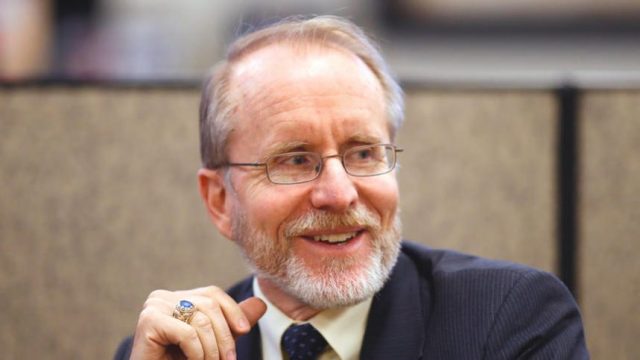The University System Has Been Underhanded in Their Handling of Chancellor Problems

FILE PHOTO: Chancellor Mark Hagerott of the North Dakota University System. ( Eric Hylden/Grand Forks Herald)
Earlier this year I broke a story about a 2016 staff survey which accused North Dakota University System Chancellor Mark Hagerott of using inappropriate language as well as engaging in gender bias and inappropriate behavior.
The response from the university system was to order a new survey, the results of which my colleague Andrew Haffner reports on today.
The upshot? It’s a much more positive portrayal of Hagerott’s performance:
Beyond the statements, the survey also had a section for employees to provide qualitative feedback that was summarized by NDUS compliance officer Karol Riedman. The final report outlines a picture of general contentment with the climate of the system office as it is now, as well as a feeling that the chancellor’s performance has improved over the past year. About 90 percent of respondents agreed with a set of positive statements that included prompts such as “I am treated with respect by my supervisor,” “Leadership is open to input from employees” and “I feel that I am a valued employee” of the NDUS.
The part of the survey that focused on improvements to the office or to Hagerott’s work since July 2016—about the time when the earlier, much more critical study was returned to then-board Chair Kathleen Neset—also found that respondents mostly believed things had gotten better over the past year, though this category also received some neutral or negative opinions. The two chancellor-specific improvement statements produced 10 “strongly agree” responses from longer-term employees attesting to his improvement in both communication and leadership. Five respondents stayed neutral in response to both prompts. […]
Individual comments and feedback from staff weren’t included in the report but the summarized remarks trended positive. Reidman stated that respondents felt the office was working better as a team and appreciated an “open-door policy” embraced by supervisors. Some employees believed office morale had improved despite systemwide budget cuts, citing an “increased perception of professionalism and respect at all levels.” Other workers noted the effects of turnover in the NDUS office, which has a current headcount of 21 people.
You can read the full survey below. Here’s an excerpt of the summary findings:
I sincerely hope that Hagerott has improved, because the last survey was deeply troubling. The problem is, to what extent can we trust this report?
I’m not sure that North Dakota’s public officials, both inside and outside the university system, do a good job with being transparent about problems with employees. Very often we will hear about problems with one public official or another, problems which sometimes escalate to the point of termination, only to learn that there wasn’t a whiff of any issues in the various evaluations conducted on that employee.
The timeline with Hagerott’s problems illustrate this point perfectly.
In April 2016 then-SBHE President Kathy Neset receives an email saying Hagerott has been “mentored” on his poor job performance. Among other things, “not referring to [univeresity system staff] age, gender, marital status, health, weight, political affiliation or personal life in your conversations with them.” He was also “mentored” for not attending board subcommittee meanings and frustrating lawmakers by focusing on his pet projects.
In June of 2016 the aforementioned staff survey was conducted which accused Hagerott of, among other things, treating male staff differently than women and losing his temper in work settings.
Yet just a couple of months later, in August of 2016, Hagerott got a positive evaluation from Neset who said his leadership was to be “commended.”
Note that while evaluations of high profile public officials such as the one Hagerott got in August of last year are routinely the subject of open records requests, the April email and June staff survey weren’t made public until earlier this year when I obtained and published them.
While I’d like to believe that Hagerott has improved, the underhanded way the North Dakota University System has handled this process leaves plenty of room for doubt.
[scribd id=365183783 key=key-FN83xl0DoQ9KlXdHSeVE mode=scroll]





